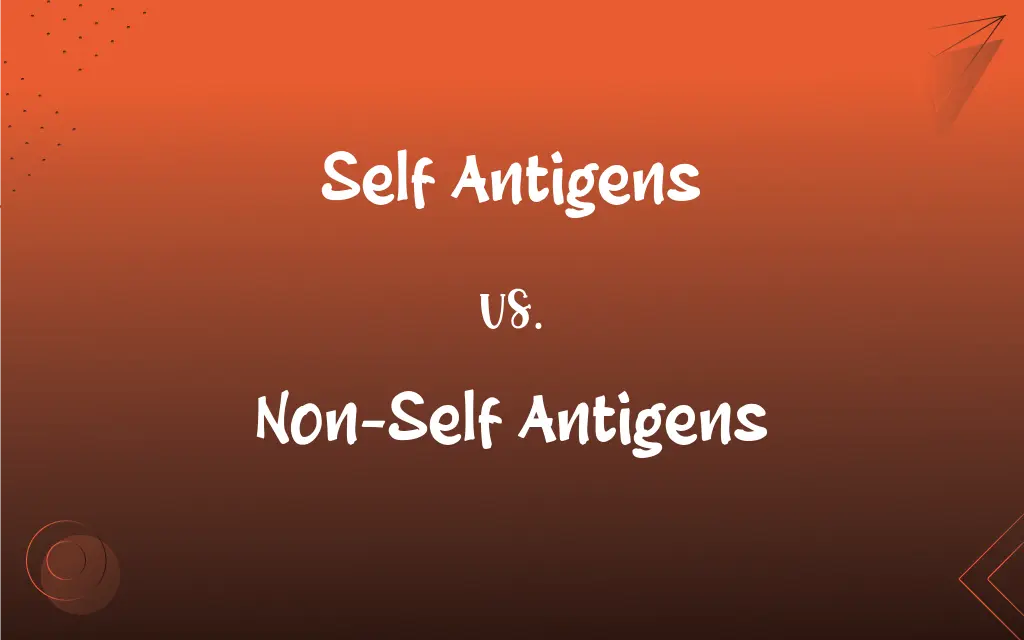Self Antigens vs. Non-Self Antigens: What's the Difference?
Edited by Aimie Carlson || By Harlon Moss || Published on February 4, 2024
Self antigens are body's own proteins, recognized as normal. Non-self antigens are foreign proteins triggering immune response.

Key Differences
Self antigens are proteins or molecules naturally present in an individual's body, recognized by the immune system as part of the self and typically ignored. Non-self antigens, in contrast, are foreign proteins or molecules that enter the body, identified as invaders, and trigger an immune response.
The immune system's tolerance to self antigens prevents it from attacking the body's own cells, a process crucial for maintaining health. However, when it comes to non-self antigens, the immune system actively works to identify and eliminate these foreign entities to protect the body from potential harm.
Autoimmune disorders occur when this recognition system fails, and the body mistakenly identifies self antigens as harmful, leading to an immune response against its own tissues. In the case of non-self antigens, a proper immune response is vital for defending against infections and diseases caused by bacteria, viruses, or other pathogens.
Vaccinations primarily work by introducing non-self antigens in a controlled manner, enabling the immune system to develop a memory of these antigens and respond more effectively upon future encounters. There's no vaccination process involving self antigens as they are naturally tolerated by the body.
Understanding the difference between self antigens and non-self antigens is crucial in organ transplantation. Transplanted organs carry non-self antigens, which can cause the recipient's immune system to reject the organ, whereas ideally, the immune system should only react to non-self antigens from harmful sources.
ADVERTISEMENT
Comparison Chart
Source
Originates within the body.
Originates outside the body.
Immune Response
Typically no immune response.
Triggers immune response.
Role in Health
Maintains normal bodily function.
Protects against infections and diseases.
Involvement in Disorders
Can lead to autoimmune diseases.
Involved in allergies and infections.
Response to Transplantation
Usually accepted by the body.
Can lead to organ rejection.
ADVERTISEMENT
Self Antigens and Non-Self Antigens Definitions
Self Antigens
Unique markers identifying cells as body's own.
Blood cells carry self antigens that differentiate them from foreign cells.
Non-Self Antigens
Potential allergens causing allergic reactions.
Pollen contains non-self antigens that can trigger allergies.
Self Antigens
Molecules tolerated by the immune system.
Self antigens in the pancreas are usually ignored by the immune system.
Non-Self Antigens
Cause of organ rejection.
Non-self antigens in a transplanted organ can lead to rejection by the host's immune system.
Self Antigens
Proteins naturally occurring in the body.
Thyroid proteins are self antigens that can be mistakenly targeted in autoimmune diseases.
Non-Self Antigens
Triggers for the immune response.
Vaccines introduce non-self antigens to stimulate immunity.
Self Antigens
Critical in organ transplant acceptance.
Matching self antigens between donor and recipient reduces organ rejection risk.
Non-Self Antigens
Identifiers of infectious agents.
Viral proteins are non-self antigens that alert the immune system to infection.
Self Antigens
Potential targets in autoimmune disorders.
In lupus, the immune system erroneously attacks self antigens in various tissues.
Non-Self Antigens
Molecules from outside the body.
Bacterial cells contain non-self antigens that activate the immune system.
Self Antigens
Plural of self-antigen
FAQs
Why are non-self antigens important?
Non-self antigens are important for triggering immune responses against infections and diseases.
What are non-self antigens?
Non-self antigens are foreign molecules that enter the body and trigger an immune response.
Can non-self antigens cause allergies?
Yes, certain non-self antigens can trigger allergic reactions.
Can self antigens cause disease?
Yes, when the immune system mistakenly targets self antigens, it can lead to autoimmune diseases.
What are self antigens?
Self antigens are the body's own molecules that are typically recognized and tolerated by the immune system.
How does the body distinguish self from non-self antigens?
The immune system uses complex recognition mechanisms involving receptors and signaling to distinguish self from non-self antigens.
How does the immune system react to self antigens?
The immune system usually does not react to self antigens, maintaining a state of self-tolerance.
What happens when self-tolerance is lost?
Loss of self-tolerance leads to autoimmune diseases, where the body attacks its own tissues.
How are self antigens related to organ transplantation?
Matching self antigens between donor and recipient can reduce the risk of organ rejection.
Do all organisms have self antigens?
All multicellular organisms have self antigens that are recognized by their immune systems.
What role do non-self antigens play in vaccinations?
Vaccinations introduce non-self antigens to help the immune system develop a memory and protection against specific pathogens.
Can infections alter self antigens?
Infections can sometimes alter self antigens, leading to autoimmune responses.
Are non-self antigens always harmful?
Non-self antigens are not always harmful; they can be benign or even beneficial in vaccination.
Can non-self antigens be used therapeutically?
Yes, non-self antigens can be used in vaccines and other therapies to boost or direct the immune response.
Are non-self antigens found in all infections?
Nearly all infections introduce non-self antigens, which help the immune system recognize and combat the infection.
Can self antigens change?
Self antigens can change in certain conditions, like cancer, making cells recognizable as abnormal to the immune system.
Do non-self antigens vary among individuals?
Yes, non-self antigens vary among individuals and species, contributing to the diversity of immune challenges.
Are self antigens involved in allergies?
Self antigens are not typically involved in allergies; allergies are usually responses to non-self antigens.
Is self-antigen recognition always accurate?
No, sometimes the immune system may mistakenly identify self antigens as harmful, leading to autoimmune diseases.
Can non-self antigens be used in diagnostic tests?
Yes, non-self antigens can be used in various diagnostic tests to detect the presence of specific pathogens or diseases.
About Author
Written by
Harlon MossHarlon is a seasoned quality moderator and accomplished content writer for Difference Wiki. An alumnus of the prestigious University of California, he earned his degree in Computer Science. Leveraging his academic background, Harlon brings a meticulous and informed perspective to his work, ensuring content accuracy and excellence.
Edited by
Aimie CarlsonAimie Carlson, holding a master's degree in English literature, is a fervent English language enthusiast. She lends her writing talents to Difference Wiki, a prominent website that specializes in comparisons, offering readers insightful analyses that both captivate and inform.







































































